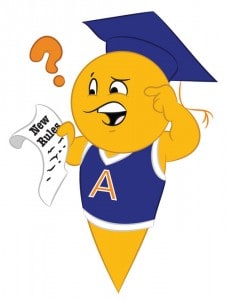Make Sure You Know The New NCAA Eligibility Standards
 In just a few weeks, a brand new group of high school students will start both their athletic and academic careers. Because of the way a bunch of rules in Division I combine together, the start of high school is extremely important. Once a student starts the ninth grade, they have 10 years and must meet a number of benchmarks along the way to use their full eligibility.
In just a few weeks, a brand new group of high school students will start both their athletic and academic careers. Because of the way a bunch of rules in Division I combine together, the start of high school is extremely important. Once a student starts the ninth grade, they have 10 years and must meet a number of benchmarks along the way to use their full eligibility.
The New Rules Start for College Freshman Entering in 2016
This group of ninth graders is different then most because they will be the first group facing new initial eligibility standards. The new standards are a significant change from the old ones including a rule that requires students to show a level of progress earlier than previously required. The challenge now is to get the word out so that large numbers of prospects do not end up ineligible.
The NCAA is now considering a plan that would allow coaches to contact athletes in eighth grade, but only for the purpose of educating them about academic standards. That is actually a decent idea, although it requires accepting that these academic communications will become recruiting pitches. Brochures and emails explaining initial eligibility standards will be elaborate and colorful productions covered in school logos. And schools will make sure to send that academic information to prospects just to show interest.
Educating high school guidance counselors seems to make sense, except for two reasons. First, given the state of high school budgets, there is no guarantee that the counselor you educate today will still be there in 2016. Second, counselors have other things to worry about than initial eligibility. Their job, first and foremost, is to make sure students graduate even if it means ending up as a nonqualifier.
The Better Plan Would be to Educate High School and Club Coaches
Even though coaches might change jobs or be fired, we can be fairly confident the position will be there. Coaches also have much more contact and often more influence over a prospect to get them motivated to take academics seriously from day one.
Even if coaches and guidance counselors are educated on the rules and are willing and able to help, prospects and their parents should not let others be in control of their eligibility. Prospects need to keep eligibility in the back of their minds and parents need to educate themselves and track progress on their own to make sure the athlete is on track.
The NCAA could help out by allowing athletes to register with the Eligibility Center (formerly the Clearinghouse) as ninth graders and push payment back later in the recruiting process. That would help all prospects get some education and guidance while only those that need it pay for certification. Unfortunately the NCAA looks to be going the other direction:
Payment is necessary to complete a registration and receive certification. Incomplete accounts will be deleted in 30 days if no pmt recd.
— Eligibility Center (@NCAA_EC) August 16, 2012
That means prospects need to educate themselves and do some of the legwork to follow along with the new rules and track their progress. Prospects need to be responsible for their own eligibility, just like they need to be responsible for their recruiting.
Do you have questions about your eligibility? Ask us below in the comments or connect with us on Twitter, Facebook or Google+!
Find opportunities for athletic scholarships and get connected to college coaches.
